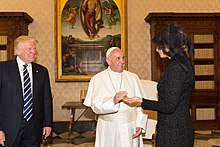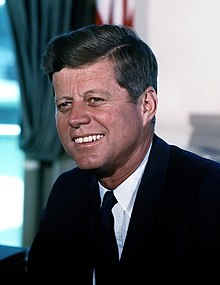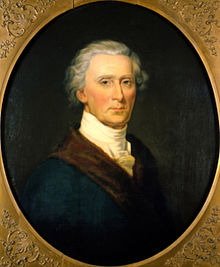Catholic Church and politics in the United States
From the 1930s to the 1950s Catholics formed a core part of the New Deal Coalition, with overlapping memberships in the church, labor unions, big city machines, and the working class, all of which promoted liberal policy positions in domestic affairs and anti-communism during the Cold War.
Beginning with the decline of unions and big city machines, increased suburbanization and with upward mobility into the middle classes, Catholics have drifted away from liberalism of the Democratic Party and toward conservatism on economic issues (such as taxes).
At the same time, he reiterated the church's defense of private property, condemned socialism, and emphasized the need for Catholics to form and join unions that were not compromised by secular and revolutionary ideologies.
From the 1930s to the 1950s Catholics formed a core part of the New Deal Coalition, with overlapping memberships in the church, labor unions, big city machines, and the working class, all of which promoted liberal policy positions in domestic affairs and anti-communism during the Cold War.
This New Deal Coalition formed under Franklin Roosevelt was led by his Postmaster General and the nation's first Irish American Roman Catholic Cabinet member James Farley.
Combining Progressive thought and Catholic theology, Ryan believed that government intervention was the most effective means of affecting positive change for his church as well as working people and the poor.
He quoted in a footnote the part of the case: The fundamental theory of liberty upon which all governments in this Union repose excludes any general power of the State to standardize its children by forcing them to accept instruction from public teachers only.
The child is not the mere creature of the State; those who nurture him and direct his destiny have the right coupled with the high duty, to recognize, and prepare him for additional duties.The Catholic Worker movement began as a means to combine Dorothy Day's history in American social activism, anarchism, and pacifism with the tenets of Catholicism (including a strong current of distributism), five years after her 1927 conversion.
American Catholics of that era were generally New Deal liberals who actively supported the CIO, viewed government as a positive force for social reform and often participated in non-communist trade unions, becoming a prominent group of the United Auto Workers.
A survey conducted by the Gallup organization in 2009 revealed that, despite the opposition of the church to abortion and embryonic stem-cell research, there is no significant difference between the opinions of Catholics and non-Catholics on these questions.
The Roman Catholic Church defines marriage as a covenant "by which a man and a woman establish between themselves a partnership of the whole of life and which is ordered by its nature to the good of the spouses and the procreation and education of offspring.
[34] Recent research by Bouke Klein Teeselink and Georgios Melios has shown that Catholics who leave the Church tend to adopt more progressive views on issues like same-sex marriage and gay rights.
Mobilization of a wide-scale anti-abortion movement among Catholics began quickly after the Roe v. Wade decision with the creation of the National Right to Life Committee (NRLC).
In 2004, Cardinal Joseph Ratzinger, then-prefect of the Congregation for the Doctrine of the Faith (who would later become Pope Benedict XVI), instructed American bishops in a confidential memorandum that communion must be denied to Catholic politicians who support legal abortion.
[citation needed] However, Cardinals O'Malley, Egan, McCarrick, Wuerl, Mahony and George have said they would not deny communion to a person in public life who supports abortion rights.
The new message was compiled into a brochure titled "Forming Consciences for Faithful Citizenship," which "emphasized that issues involving 'intrinsically evil' actions could not be equated morally with others," according to the Times.
[43] Research has found that Catholics who disaffiliate from the Church tend to shift towards more progressive stances on social issues, including increased support for abortion rights.
While the referendum failed, "deployment of the Church's political muscle," according to historian Leslie Tentler, offended non-Catholics and led Cushing to relax his position when the issue was debated again in the 1960s.
"[52] In addressing the Pew Research Center's Forum on Religion & Public Life in 2009, Archbishop Charles J. Chaput of Denver discussed the need when talking about reforming immigration law, to do so "... in a comprehensive way, so that justice is done and our borders are protected.
The publication by Francis put pressure on Catholics seeking the Republican Party nomination for President in 2016, including Jeb Bush and Rick Santorum, who "have questioned or denied the established science of human-caused climate change, and have harshly criticized policies designed to tax or regulate the burning of fossil fuels.
Reagan's vice president George H. W. Bush won about the same number of votes as Michael Dukakis, making 1988 the third presidential election in a row in which Catholics failed to support the Democratic candidate as they traditionally did.
[66] This trend reversed slightly in 1996, when Clinton's share of Catholics in general was four percentage points ahead of overall, and they comprised about half of the margin between him and the unsuccessful challenger Robert Dole.
Smith was personally in favor of relaxation or repeal of Prohibition laws despite its status as part of the nation's Constitution, but the Democratic Party split north and south on the issue.
To address fears that his Roman Catholicism would influence his decision-making, John F. Kennedy famously told the Greater Houston Ministerial Association on September 12, 1960, "I am not the Catholic candidate for President.
[88] In 2020, Justice Ruth Bader Ginsburg died; President Donald Trump nominated Amy Coney Barrett, a Catholic, to fill the vacancy; she was subsequently confirmed by the Senate and sworn in to the bench.
Past Catholic U.S. attorneys general include Roger B. Taney,[83] Joseph McKenna,[83] Charles Bonaparte,[99] Frank Murphy, James McGranery, J. Howard McGrath, Robert F. Kennedy, William Barr, and Alberto Gonzales.
[104] Past Catholic secretaries of labor include Maurice Tobin,[105] Martin Durkin, James P. Mitchell, Ann McLaughlin Korologos, Alexis Herman,[106] Hilda Solis,[107][108][109] and Tom Perez.
[110] Past Catholic secretaries of housing and urban development include Moon Landrieu, Henry Cisneros, Andrew Cuomo,[111] Mel Martínez, and Julián Castro.
The Catholic secretaries in the Biden administration were Lloyd Austin (Defense), Deb Haaland (Interior), Gina Raimondo (Commerce), Marty Walsh (Labor), Xavier Becerra (Health and Human Services), Miguel Cardona (Education), and Jennifer Granholm (Energy).
[123][124] 1815 Augustin McCarty, New Orleans 1824 John Williams, Detroit 1842 Solomon Hillman, Baltimore 1844 Bernard Pratte, St Louis 1846 Solomin Juneau, Milwaukee 1853 Antonio F. Coronel, Los Angeles 1856 Thomas Dyer, Chicago 1867 Frank McCoppin, San Francisco 1876 Philip Becker, Buffalo 1881 William Russell Grace, New York City 1885 Hugh O'Brien, Boston 1893 Robert Blee, Cleveland 1893 Bernard J. McKenna Pittsburgh 1906 Edward Dempsey, Cincinnati 1962 James Tate, Philadelphia





